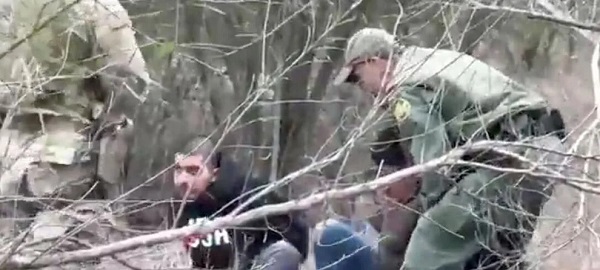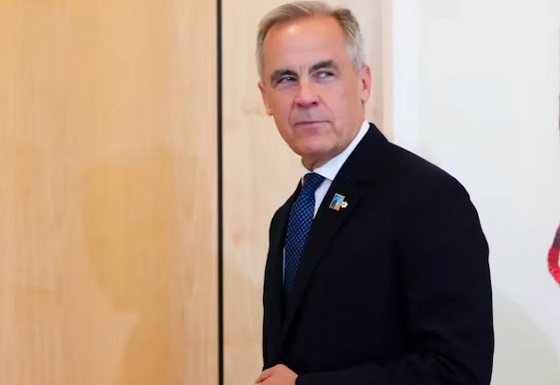With research assistance from James Rushmore
Timeline: The Case of Kilmar Armando Abrego Garcia
With President Trump sitting next to him, El Salvador President Nayib Bukele told reporters in the Oval Office on Monday that no, he is not going to release Kilmar Armando Abrego Garcia from his country’s Terrorism Confinement Center (CECOT), despite a Justice Department lawyer admitting in a court filing that Abrego Garcia’s deportation last month was an “administrative error.”
No matter, Bukele said when asked if would return him to the U.S.:
Bukele: Of course I’m not going to do it. The question is preposterous. How can I smuggle a terrorist into the United States. I don’t have the power to return him to the United States.
Reporter: But you could release him inside El Salvador.
Bukele: Yeah, but I’m not releasing, I mean I’m not very fond of releasing terrorists into our country. We just turned the murder capital of the world into the safest country in the Western hemisphere, and you want us to go back into releasing criminals so we can go back to being the murder capital of the world? That’s not going to happen.
Not that there was any doubt what Bukele would say. Attorney General Pam Bondi set the tone early on in the meeting. She explained what the Supreme Court meant last week when it said a lower court ruling “properly requires the government to ‘facilitate’ Abrego Garcia’s release from custody in El Salvador.”
The Supreme Court ruled, president, that if El Salvador wants to return him … we would facilitate it, meaning provide a plane.
It brings to mind President Clinton’s infamous grand jury testimony when he said: “It depends upon what the meaning of the word ‘is’ is.”
Abrego-Garcia left El Salvador and illegally entered the U.S. in 2011. His status as an illegal immigrant changed after he was arrested in 2019 and the Department of Homeland Security accused him of being a member of the MS-13 gang. Abrego Garcia fought the accusation and applied for asylum. Instead, an immigration judge granted him “withholding of removal” status.
A federal judge wrote in an April 6 opinion that in El Salvador “the Barrio 18 gang had been targeting him and threatening him with death because of his family’s pupusa business.”
The Justice Department argues its hands are tied. It doesn’t matter that the U.S. is paying El Salvador $6 million a year to house U.S. deportees at CECOT.
“The United States does not have control over Abrego Garcia. Or the sovereign nation of El Salvador,” says one court filing.
Below is a timeline of the case since Abrego Garcia was arrested last month, leading up to Monday’s Oval Office meeting with Bukele.
ICE agents stop Abrego Garcia and tell him that he is no longer under “withholding of removal” status. The Trump administration says he is a member of the MS-13 gang, which the president has designated a foreign terrorist organization.
Abrego Garcia, who denies he is part of MS-13, is sent to an ICE detention facility in La Villa, Texas, and from there he is deported to El Salvador on March 15 along with 260 others, primarily Venezuelan nationals. He is being held in CECOT, a prison that has a capacity of 40,000 inmates.
Abrego Garcia and his wife, Jennifer Vasquez Sura, file a lawsuit that notes Abrego Garcia has been in the U.S. legally since 2019 under withholding of removal status, and that the designation was never lifted.
They also accuse the government of sending Abrego Garcia to El Salvador despite “knowing that he would be immediately incarcerated and tortured in that country’s most notorious prison; indeed, Defendants have paid the government of El Salvador millions of dollars to do exactly that. Such conduct shocks the conscience and cries out for immediate judicial relief.”
The lawsuit requests the court order the U.S. government to tell the government of El Salvador to release and deliver Abrego Garcia to the U.S. Embassy in San Salvador.
The Justice Department acknowledges in a court filing that “although ICE was aware of his protection from removal to El Salvador, Abrego Garcia was removed to El Salvador because of an administrative error.”
Still, the Justice Department argues the motion should be denied because the court “has no power” over El Salvador. Justice Department attorneys argue:
Under their (plaintiffs) logic, this Court may assume jurisdiction to decide whether the order is legal, but if the order were determined legal, then jurisdiction would disappear again.
The government also says there’s no proof that Abrego Garcia will be tortured or killed in CECOT:
Plaintiffs point to little evidence about conditions in CECOT itself (focusing primarily on its capacity for detainees), instead extrapolating from allegations about conditions in different Salvadoran prisons. While there may be allegations of abuses in other Salvadoran prisons—very few in relation to the large number of detainees—there is no clear showing that Abrego Garcia himself is likely to be tortured or killed in CECOT. More fundamentally, this Court should defer to the government’s determination that Abrego Garcia will not likely be tortured or killed in El Salvador.
U.S. District Court Judge Paula Xinis orders the Trump Administration to return Abrego Garcia to the U.S. by 11:59 p.m., April 7. She writes:
Plaintiffs are likely to succeed on the merits because Abrego Garcia was removed to El Salvador In violation of the Immigration and Nationality Act…and without any legal process; his continued presence in El Salvador, for obvious reasons, constitutes irreparable harm; the balance of equities and the public interest weigh in favor of returning him to the United States; and issuance of a preliminary injunction without further delay is necessary to restore him to the status quo and to avoid ongoing irreparable harm resulting from Abrego Garcia’s unlawful removal.
The Justice Department appeals the order, calling it “indefensible” that “a federal district judge ordered the United States to force El Salvador to send one of its citizens—a member of MS-13, no less—back to the United States by midnight on Monday. If there was ever a case for an emergency stay pending appeal, this would be it.”
More from the appellate motion:
Foremost, [the order] commands Defendants to do something they have no independent authority to do: Make El Salvador release Abrego Garcia, and send him to America. That is why Plaintiffs did not even ask the district court for an order directing Abrego Garcia’s return. As Plaintiffs themselves acknowledged, a federal court “has no jurisdiction over the Government of El Salvador and cannot force that sovereign nation to release Plaintiff Abrego Garcia from its prison.” That concession is all that is needed to order a stay here. No federal court has the power to command the Executive to engage in a certain act of foreign relations; that is the exclusive prerogative of Article II, immune from superintendence by Article III.
Judge Xinis issues a follow-up memorandum opinion to her April 4 order:
Although the legal basis for the mass removal of hundreds of individuals to El Salvador remains disturbingly unclear, Abrego Garcia’s case is categorically different—there were no legal grounds whatsoever for his arrest, detention, or removal. Nor does any evidence suggest that Abrego Garcia is being held in CECOT at the behest of Salvadoran authorities to answer for crimes in that country. Rather, his detention appears wholly lawless.
The judge also writes that in 2019, Homeland Security “relied principally on a singular unsubstantiated allegation that Abrego Garcia was a member of MS-13.”
A three-judge panel of Fourth U.S. Circuit Court of Appeals unanimously denies the government’s motion for a stay of Xinis’ order that say Abrego Garcia must be returned to the U.S. by 11:59 p.m. Judge Stephanie Thacker writes:
The United States Government has no legal authority to snatch a person who is lawfully present in the United States off the street and remove him from the country without due process. The Government’s contention otherwise, and its argument that the federal courts are powerless to intervene, are unconscionable.
The Trump Administration appeals to the U.S. Supreme Court, and Chief Justice John Roberts grants an administrative stay to give justices time to consider the case.
Following the stay, Bondi accuses Abrego Garcia of being a “violent gang member”:
We will continue to fight for the safety of Americans and get these people out of our country to make America safe.
The Supreme Court rules against the Trump administration but directs Judge Xinis to “clarify” a portion of her ruling. From the Supreme Court’s decision:
The order properly requires the Government to “facilitate” Abrego Garcia’s release from custody in El Salvador and to ensure that his case is handled as it would have been had he not been improperly sent to El Salvador. The intended scope of the term “effectuate” in the District Court’s order is, however, unclear, and may exceed the District Court’s authority. The District Court should clarify its directive, with due regard for the deference owed to the Executive Branch in the conduct of foreign affairs. For its part, the Government should be prepared to share what it can concerning the steps it has taken and the prospect of further steps.
If the Supreme Court said, ‘Bring somebody back,’ I would do that. I respect the Supreme Court.
President Trump says that aboard Air Force One a day after the Supreme Court upholds a lower court ruling and says the government should “facilitate” Abrego Garcia’s return to the U.S.
Meanwhile, Judge Xinis issues a new order that directs the government to “take all available steps to facilitate the return” of Abrego Garcia. In a hearing, she also makes clear her frustration with the Justice Department.
“The record, as it stands, is, despite this court’s clear directive, your clients have done nothing to facilitate the return of Mr. Abrego Garcia,” she says.
Xinis also orders the administration to provide daily updates on the status of Abrego Garcia’s return. She also criticizes Justice Department attorneys in her order:
During the hearing, the Court posed straightforward questions, including: Where is Abrego Garcia right now? What steps had Defendants taken to facilitate his return while the Court’s initial order on injunctive relief was in effect…? Defendants’ counsel responded that he could not answer these questions, and at times suggested that Defendants had withheld such information from him. As a result, counsel could not confirm, and thus did not advance any evidence, that Defendants had done anything to facilitate Abrego Garcia’s return. This remained Defendants’ position even after this Court reminded them that the Supreme Court of the United States expressly affirmed this Court’s authority to require the Government “facilitate” Abrego Garcia’s return. From this Court’s perspective, Defendants’ contention that they could not answer these basic questions absent some nonspecific “vetting” that has yet to take place, provides no basis for their lack of compliance.
A State Department official reports to the court that Abrego Garcia is “alive and secure” at CECOT. “He is detained pursuant to the sovereign, domestic authority of El Salvador,” the State Department’s Michael Kozak says in a filing.
However, he does not give an update on the status of Abrego Garcia’s return to the U.S.



 By
By 











